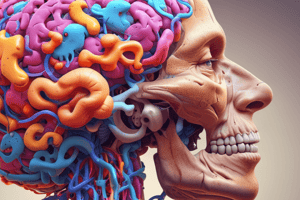Podcast
Questions and Answers
Ataxia is a disorder that primarily affects the ability to speak.
Ataxia is a disorder that primarily affects the ability to speak.
False (B)
Which of these conditions is characterized by slow, writhing movements, primarily affecting the hands and feet?
Which of these conditions is characterized by slow, writhing movements, primarily affecting the hands and feet?
- Chorea
- Athetosis (correct)
- Aphasia
- Ataxia
What is the name of the brain structure primarily responsible for coordinating movement, and often affected in cases of Ataxia?
What is the name of the brain structure primarily responsible for coordinating movement, and often affected in cases of Ataxia?
Cerebellum
The loss or absence of the sense of smell is called ______.
The loss or absence of the sense of smell is called ______.
Match the neurological condition with its corresponding description:
Match the neurological condition with its corresponding description:
Flashcards
Ataxia
Ataxia
A lack of muscle coordination or control during voluntary movements, affecting activities like walking and speech.
Aphasia
Aphasia
A language disorder affecting the ability to communicate, often due to brain injury or stroke.
Anosmia
Anosmia
The loss or absence of the sense of smell, which can be caused by various factors.
Chorea
Chorea
Signup and view all the flashcards
Chiari Malformation
Chiari Malformation
Signup and view all the flashcards
Study Notes
Neurological Disorders
-
Ataxia: A disorder of muscle coordination during voluntary movement. Affects walking, speech, and swallowing. Caused by cerebellum damage.
-
Aphasia: Language disorder affecting communication. Causes include brain injury or stroke. Types include expressive aphasia (speech production difficulty) and receptive aphasia (speech comprehension difficulty).
-
Anosmia: Loss or absence of the sense of smell. Possible causes include nasal blockages, head injuries, infections, and neurological diseases. It can be an early warning sign for diseases like Parkinson's or Alzheimer's.
-
Chorea: Involuntary, jerky, unpredictable movements in various body parts. Associated with Huntington's disease, Sydenham's chorea, and certain medications.
-
Athetosis: Slow, writhing, continuous movements, often in hands and feet. Linked to cerebral palsy and other forms of brain damage.
-
Chiari Malformation: Structural brain defect where part of the cerebellum extends into the spinal canal. Symptoms include headaches, balance problems, and other neurological issues. May require surgery in severe cases.
Studying That Suits You
Use AI to generate personalized quizzes and flashcards to suit your learning preferences.




